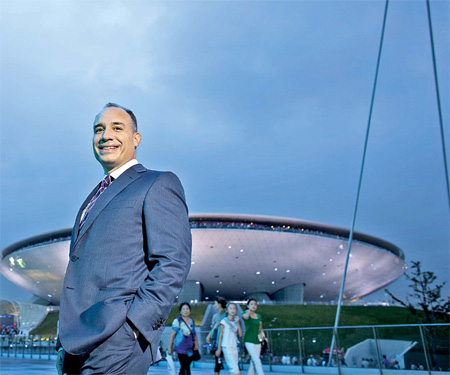|

AEG China CEO John Cappo in front of the Mercedes-Benz Arena. Provided to China Daily
|
The Shanghai Expo's Culture Center is set to become the city's conversation piece with its re-branding as a "365-day-a-year lifestyle destination". Mu Qian reports
The Shanghai World Expo Culture Center, which attracted more than 8 million visitors over the past six months, will continue to serve the public, but in a different way. The 18,000-seat venue, re-branded as the Mercedes-Benz Arena after the Expo, is "going to be on a par with the O2 in London and Madison Square Garden in New York as a must-play venue for every artist that tours Asia", according to Timothy J. Leiweke, president and CEO of the Los Angeles-based AEG (Anschutz Entertainment Group).
AEG is operating the Mercedes-Benz Arena in cooperation with its Chinese partner, the Oriental Pearl Group (OPG), with the NBA holding a minor stake.
The arena will open with five concerts of the nation's top diva Faye Wong on Nov 19, although the official opening ceremony will be held on Jan 15 on the 125th anniversary of Mercedes-Benz, which has bought the naming rights for 10 years.
Apart from the Faye Wong concerts, the two-month launch program will also include concerts by Hong Kong star Jacky Cheung, Spanish tenor Jose Carreras, as well as the large-scale family show Walking With Dinosaurs. Concerts by Wong and Cheung have all been sold out.
The AEG-OPG joint venture managed the culture center during the Expo too.
"We operated the venue on behalf of the Shanghai Expo Bureau. From now on, we'll take over the commercial operation of the venue," says John Cappo, president and CEO of AEG China.
According to Cappo, China has not been a leg for most touring international artists largely owing to the lack of venues of international standards. For example, before Beyonce performed in Beijing last year at the Wukesong Arena, which AEG manages and helped redesign after the Olympic Games, there was no venue with a mother grid that could hold all the required equipment on the ceiling.
"Now that these venues in Beijing and Shanghai are in place, we will see a lot more international artists wanting to come to China," Cappo says.
While the Internet has seriously affected the distribution of recorded music, Cappo believes that this has provided a bigger opportunity for live music shows as there is no other way for artists to make money.
Cao Zhiyong, OPG vice president, sees the appearance of large-scale arenas as an opportunity to boost China's local entertainment industry, as the most popular shows are still those in the Chinese language.
"Both we and AEG are optimistic about the future of the live entertainment industry in China, and that is why we are combining our resources," Cao says.
Cappo believes both the quality and quantity of shows will increase rapidly, as good service and positive customer feedback will bring in repeat audiences.
More than a performance venue, Cappo says, the Mercedes-Benz Arena is going to be a "365-day-a-year lifestyle destination". It will incorporate a public ice skating rink, a 20,000-square-meter retail podium of concept shops, a variety of food and beverage outlets, a music club that seats up to 800 for intimate live entertainment events, and a six-screen movie cinema showcasing both international and Chinese movies.
"You can go there before a concert to watch a movie, get something to eat, walk around, or go shopping. There are many things to do within the building," Cappo says.
Most of the existing large-scale live music venues in China were built for sporting events, such as the Workers' Gymnasium in Beijing and the Shanghai Gymnasium, but the Mercedes-Benz Arena has been designed as a multi-purpose arena from the beginning.
AEG, which operates and consults with more than 90 venues worldwide including the O2 in London, O2World in Berlin and Acer Arena in Sydney, was involved in the design of the Shanghai arena.
"All of this should start from the design stage. If the design is not right, it will affect operations, revenue potential, and critically customer experience in the venue in future," Cappo says.
The Mercedes-Benz Arena can be converted to hold audiences ranging from 5,000 to 18,000, depending on the scale of the event. Besides ordinary seats, there are 82 luxury suites on two levels, where catering will be available.
"When people have a good customer experience, they will return and that will encourage more performances because artists can make money by performing," Cappo says.
AEG China is also working with Hangzhou, Zhejiang province, and Chengdu, Sichuan province, and some other Chinese cities on plans to build multi-purpose arenas and entertainment districts. The company is looking at managing a network of four to six arenas in the country in the coming few years.
"We began focusing on China in 2008 as we knew the Olympics would leave several large-scale venues," Cappo says. "In China, the live entertainment industry is very underdeveloped, and there is an opportunity to come in and help facilitate a sustainable growth model."
Owner of the Staples Center, home of the Los Angeles Lakers, AEG will also use the Mercedes-Benz Arena for sporting competitions, and talks with the Shanghai Sharks basketball team are under way.
Cappo says that the group will bring its international experience in managing arenas to the Chinese market, but will also cater to local specifics. For example, banquet dinners are more common in China than in the West, and the six Chinese restaurants in the Mercedes-Benz Arena can serve companies that want to have banquets before or after a performance.
"What we are trying to create is a more leisure-based lifestyle, in which people go to live entertainment and have fun with their family and friends," Cappo says.
"We know that people like live entertainment, everywhere in the world."
(China Daily 11/05/2010 page18)
|


